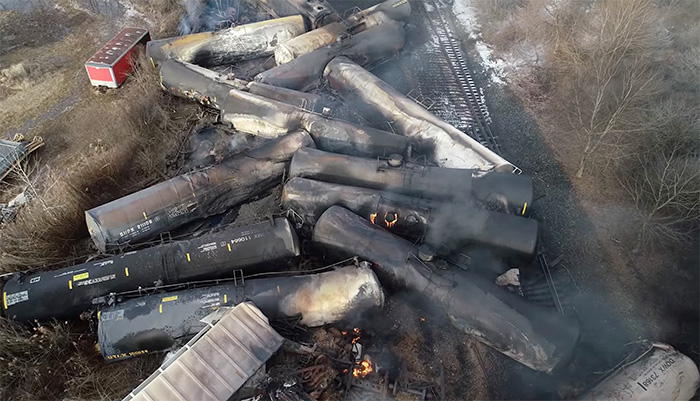Photo credit: National Transportation Safety Board/Wikimedia Commons
On February 3, 2023, East Palestine, Ohio, became the center of an unprecedented environmental disaster when a train transporting hazardous chemicals derailed, unleashing a wave of toxic substances into the surroundings. The aftermath of this incident, compounded by the decision to incinerate the waste three days later, has led to a prolonged and far-reaching impact that continues to affect the community to this day.
Over a year since the accident, the White House has announced a substantial allocation of government funds, spearheaded by the National Institutes of Environmental Health Science (NIEHS), to support early-stage exploratory research. This funding includes a dedicated focus on studying the persistent health consequences of the East Palestine derailment.
The repercussions of the East Palestine derailment were severe, causing extensive environmental harm and resulting in the loss of over 40,000 animals. The decision to burn the hazardous waste expanded the scope of the impact, contributing to a lingering crisis that demands thorough investigation and understanding.
Beyond environmental destruction, the incident triggered a range of health issues among the residents of East Palestine. Symptoms reported include burning eyes, nose, and throat, as well as headaches and sinus problems. While some experienced only short-term effects, a significant portion of the population still reports ongoing symptoms even a year after the incident. Concerns are mounting regarding potential long-term health effects that may continue to surface.
Recognizing the urgent need for a comprehensive study, researchers from the University of California San Diego are set to spearhead one of the newly funded research projects. Beatrice Golomb, M.D., Ph.D., a professor in the Department of Medicine at UC San Diego School of Medicine, is known for her research on the effects of various toxins, particularly among Gulf War veterans. Golomb initiated the study in response to early messaging that downplayed the potential health ramifications of the East Palestine derailment.
Golomb and her research team are undertaking a multifaceted approach, gathering both self-reported and biological data from the citizens of East Palestine. This comprehensive dataset aims to provide scientists and government agencies with a nuanced understanding of the accident's effects, enabling informed decision-making and preventive measures to mitigate further harm.
As the NIH commits substantial funding for continued research into the East Palestine derailment, the focus on understanding both the immediate and potential long-term health consequences is crucial. This new study signifies a dedicated effort to unravel the complexities of this environmental disaster and pave the way for a more resilient and prepared future.
“Many people who don’t live in East Palestine will have put the tragedy out of their minds by now, but for the people who live there, there is no forgetting,” said Golomb. “It’s critical that we understand the full scope of what occurred and its long-term ramifications so we can help the citizens of East Palestine and improve future disaster preparedness.”
The East Palestine Health Effects Study is actively seeking participants and community support. To learn more about the study or to volunteer, please visit the Golomb Lab website.
– Miles Martin
